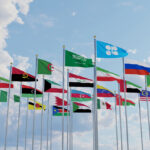President Maduro to the world’s oil producers: “The minimum, minimum price should be $70”
Oil producing countries have been negatively affected by the dramatic fall in the price of oil since the middle of last year, and some have been hit harder than others. Venezuela, in particular, is one OPEC member that is feeling the pressure. Why? Because 95% of Venezuela’s export earnings and 25% of GDP, according to data from OPEC, come from oil, leaving the country extremely exposed to a fall in oil prices.
Venezuela has called on OPEC to hold an emergency meeting in order to find a way to stabilize prices, but a source from Saudi Arabia, the group’s largest producer, said that holding a meeting that might not conclude with a definitive answer would have negative effects. “If we are meeting for the sake of a meeting, it would backfire,” the source said.
Saudi Arabia itself is likely to post a deficit of 19.5% of GDP this year, and has been forced to spend its sovereign funds in order to maintain its currency’s peg to the U.S. dollar. The strategy has seen Riyadh sell off about $60 billion in the last 10 months alone, prompting ratings agency Fitch to downgrade the outlook for the country to “negative.”
Touring the Oil Patch
Venezuela does not have the same kind of financial cushion to fall back on as Saudi Arabia, however, which has sent Venezuelan President Nicolas Maduro on a tour around other oil producing countries in the hopes of finding a solution that bolsters prices.
Maduro hopes to call a summit between both OPEC and non-OPEC producers that would focus on increasing prices, rather than limiting volumes, officials said today.
The country seeks a fair price for oil that will support economic growth and energy demand, Oil Minister Eulogio Del Pino said in a meeting between Venezuelan and Saudi Arabian officials in Caracas, reports Bloomberg. Venezuela hopes to develop a price floor for oil that would be analyzed every quarter, he said.
“The minimum, minimum price should be $70,” said Maduro during his weekly program broadcast on state television. “Oil at $70 a barrel guarantees investments needed for global energy and economic stability.”
Including non-OPEC members
Venezuela has been expanding its calls to exporting countries outside of OPEC as well in an attempt to bring prices back to a point where it can balance the country’s budget. For Venezuela, that means $89 per barrel Brent crude, said Robert Burgess, an analyst for Deutsche Bank.
“I can see the Saudis giving the Venezuelans permission to pursue this idea, without pushing it themselves,” said Tim Evans, an energy analyst at Citi Futures Perspective. “A major hurdle is that non-OPEC countries might not be interested in such a meeting after already cutting their expenditures and making other moves. They probably feel they’ve already made their contribution.”
Russia has been one of the main focuses of Maduro’s push to include non-OPEC members in talks to support oil prices. Maduro met with Russian President Vladimir Putin in Beijing while attending a Chinese military parade to mark 70 years since the end of World War II in Asia, where the two spoke of some “initiatives” agreed between the pair, reports Reuters.
“Both parties noted during the meeting that such unstable oil prices are not in the interests of the two countries and, of course, the countries should integrate their efforts in terms of coordination to facilitate a boost in oil prices,” said Kremlin spokesman Dmitry Peskov. “However, President Putin drew attention to the fact that there could be no direct actions, this is a market process. There are lots of factors which are having an impact and that should be taken into consideration very carefully.”
Moscow has said in the past that it is unwilling to deliberately cut its crude oil output to support prices. Russia’s budget is also heavily reliant on the sale of crude oil and natural gas, and Putin’s administration has been reluctant to cut production if it means losing market share.







